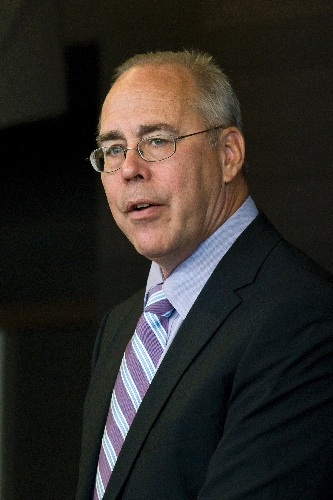UNLV faculty warned higher ed system may be forced to declare bankruptcy
UNLV is planning on bankruptcy.
That was the message the university's administrators delivered to a gathering of faculty on Tuesday.
"I never thought this day would come," said Michael Bowers, the provost. He paused, on the verge of breaking down. "But we have to plan in case it does."
President Neal Smatresk told the Faculty Senate that he hopes budget cuts proposed by Gov. Brian Sandoval do not become reality. But university officials are moving ahead as if they will.
"To not prepare would leave our institution horribly vulnerable," he said.
Smatresk said he believes the state's higher education system will have to declare financial exigency, a declaration similar to bankruptcy, to deal with the cuts.
Such a declaration would allow the higher education system to fire tenured faculty without regard to contracts. Bylaws already were changed last year to allow salary cuts on tenured faculty if the Legislature implements them.
"Our state is nearing a state of fiscal collapse," Smatresk said.
James Dean Leavitt, chairman of the Board of Regents, said the board would consider exigency a last resort only.
Under Sandoval's proposal, the University of Nevada, Las Vegas will have to cut $47.5 million from its budget over the next two years. Smatresk said the university already cut $49 million in the past four years.
Most of the past cuts were focused on nonacademic areas, and most were done on an across-the-board basis.
But Smatresk said that is not possible anymore. He said departments, programs and perhaps even entire colleges will have to be eliminated. Last year, the university cut several programs to deal with cuts.
Bowers, in a memo sent Tuesday to the university's deans and vice presidents, said more across-the-board cuts will "do nothing other than to ensure the mediocrity of all programs."
He said $25 million of the $47.5 million cuts this time will have to come from academic areas.
In his memo, Bowers outlined the amounts each college will have to cut. The cuts will be proportional to what percentage of the university's overall state-supported budget the college normally gets.
For example, if a college normally gets 10 percent of the overall state-supported budget, it will have to cut 10 percent of the total $25 million, or $2.5 million.
The largest cuts, according to Bowers' memo, will be:
■ The College of Liberal Arts, $3.77 million
■ The School of Dental Medicine, $2.90 million
■ The College of Sciences, $2.82 million
■ The libraries, $2.75 million
■ The College of Business, $2.45 million
■ The College of Fine Arts, $2.31 million
"These targets are going to be difficult to meet," Bowers told Tuesday's faculty gathering. "They are going to be painful to meet. No doubt about it."
Bowers gave the deans a deadline of Feb. 25 to respond with recommendations on how to cut those amounts from their colleges' budgets.
Once that is done, administrators will make their recommendations to a faculty advisory committee, which will then make a recommendation to the president. Smatresk will have the final decision.
Smatresk cautioned that although the request for ideas about what to cut spreads them equally, that will not happen in reality.
"We will cut more from some colleges and less from others," he said.
He said the main goal will be to preserve the university's core mission of research and teaching.
Gerry Bomotti, senior vice president for finance and business, said the plans assume several things, including a 10 percent student fee increase in each of the next two years and a 5 percent salary cut for all university employees. Only the higher education system's Board of Regents could implement those, however.
Many in the room seemed stunned when the three administrators were through speaking.
Faculty Senate President Cecilia Maldonado had prepared a statement to read. In it, she said she was sad and angry and sick.
She said she was sick of political ideology. Sick of people who attack faculty salaries. Sick of hearing that Nevadans don't value education. Sick that this same debate about whether higher education is a "cost" or an "investment" has been going on for 20 years.
"I'm sick that we never seem to learn our lessons," she said.
Maldonado said the cuts will make it difficult to recruit and retain talented faculty and students.
She began to cry, then composed herself and continued, saying the higher education system should impose cuts elsewhere to save UNLV.
The room broke into applause when she was through.
Contact reporter Richard Lake at rlake@reviewjournal.com or 702-383-0307.
Memo to Deans from Michael Bowers

















